RESOURCE TYPE
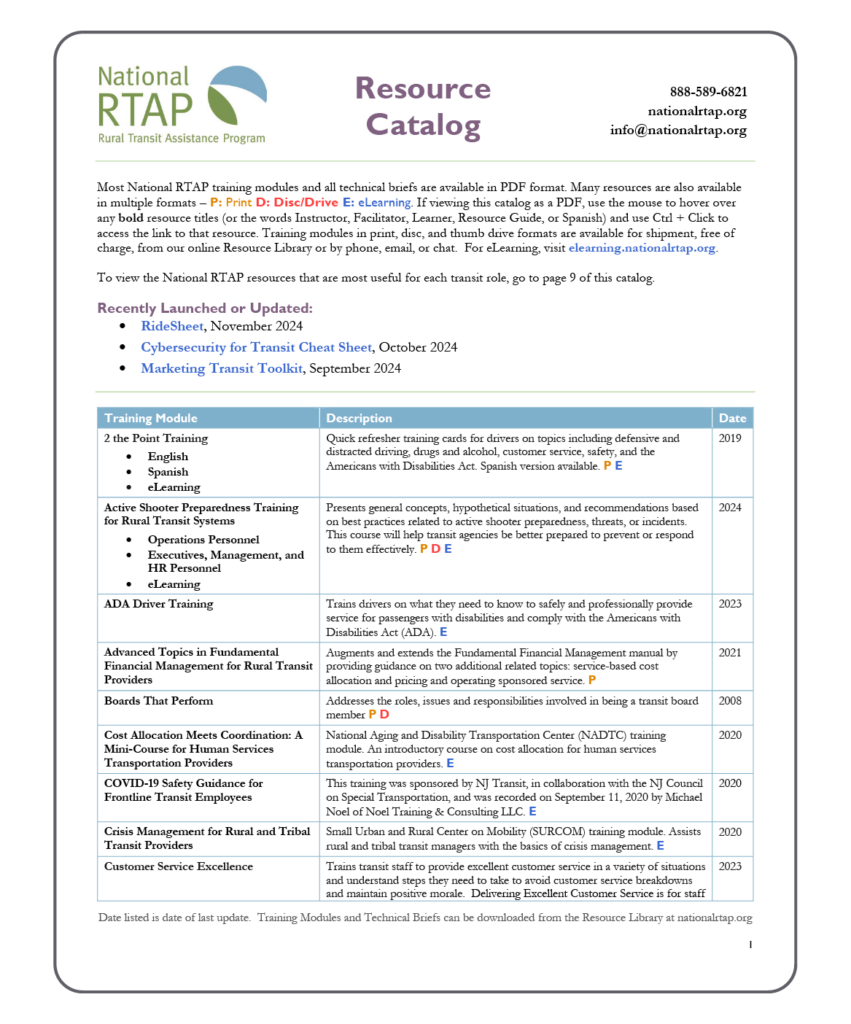
National RTAP Resource Catalogue
The National Rural Transit Assistance Program (National RTAP) aims to address the training and technical assistance needs of rural and tribal transit operators across the nation. They provide free technical assistance programs and resources including training materials, webinars, newsletters and technical briefs, peer resources, research, and innovative technology initiatives. This Resource Catalogue details all products available for ordering or online use.
National RTAP
TOPICS: Policy and Planning , Safety and Health , Training
Check out some trainings that may be most useful for transit frontline workers:
- Safety
- Active Shooter Preparedness Training for Rural Transit Systems
- COVID-19 Safety Guidelines for Frontline Transit Employees
- Emergency Procedures for Rural Transit Drivers
- Problem Passengers: Managing Difficult Passengers & Situations
- START (Safety Training & Rural Transit) Training
- Substance Abuse Awareness Training for Employees
- Transit and Human Trafficking
- Drivers/Dispatchers
- 2 the Point Training (available in Spanish)
- ADA Driver Training
- Customer Service Excellence
- Customer Service for Rural and Tribal Transit Providers
- Dispatching and Scheduling Training for Rural Transit Systems
- Essential Skills for Trainers
- Essential Spanish for Rural Transit
- HR
- HR Training Shorts on Employee Recognition, Interview Questions, Onboarding, and Performance Appraisals
Check out some technical briefs and toolkits relevant to the frontline transit workforce:
- Safety
- Coronavirus Disease 2019 (COVID-19): Information and Resources for Transit
- Healthy Habits: Reducing Stress and Fatigue and Increasing your Energy
- Incident and Injury Report Form
- Responding to Transit Incidents
- Seasonal Flu: Information and Resources
- Substance Abuse Awareness Training, Testing, and Compliance
- Threat and Vulnerability Toolkit
- Trainers
- Bus Roadeo Toolkit
- Training Adult Learners: How to Reach and Engage Your Audience
- Drivers/Dispatchers
- Customer Service in Rural Transit: How to Identify and Meet Customer Needs
- Emergency Response Checklist: After Normal Operating Hours & Emergency Response Checklist: During Normal Operating Hours
- Entry-Level Driver Training Requirements
- Essential Spanish for Rural Transit
- Mobile Driver Training Simulators
- HR
- Applying Good Business Practices: Hiring, Training and Evaluating Employees
Offerings as of January 2025
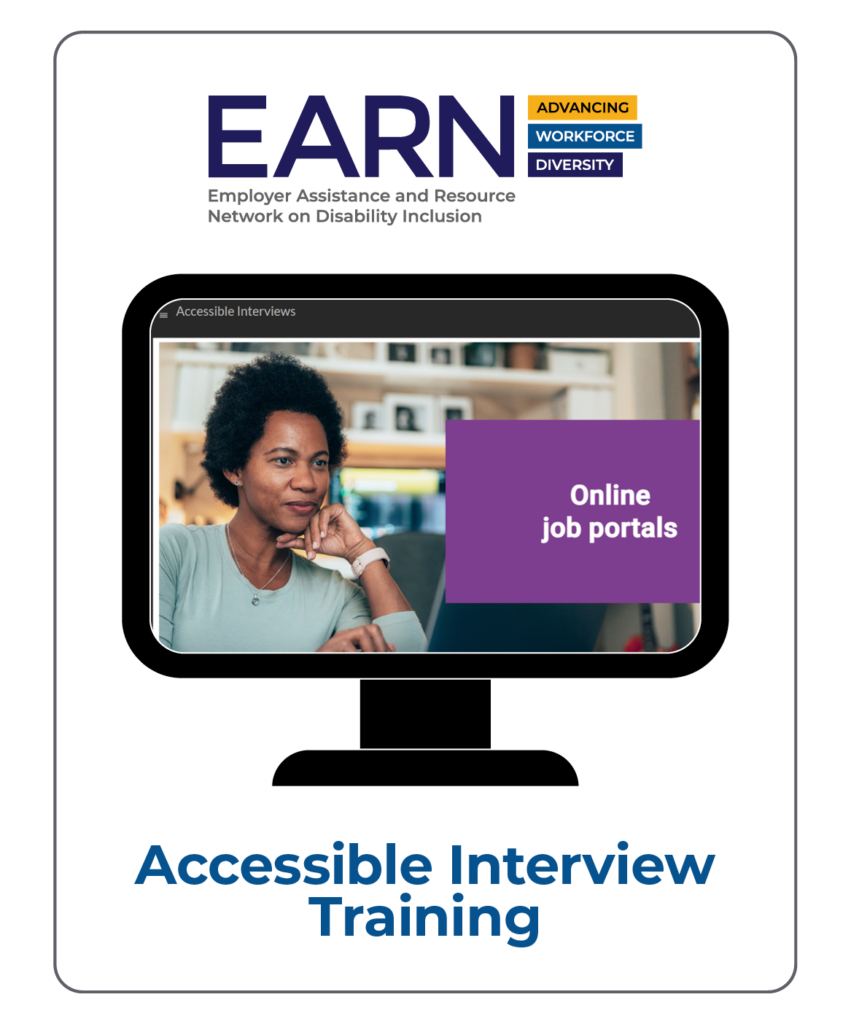
Accessible Interview Training
Employer Assistance and Resource Network (EARN)
Explore EARN’s “Accessible Interviews” training to learn how to create an interview process that is both accessible and effective for candidates with disabilities. This short course is designed to complement and expand upon the information in EARN’s Framework, which offers guidance on improving workplace culture.
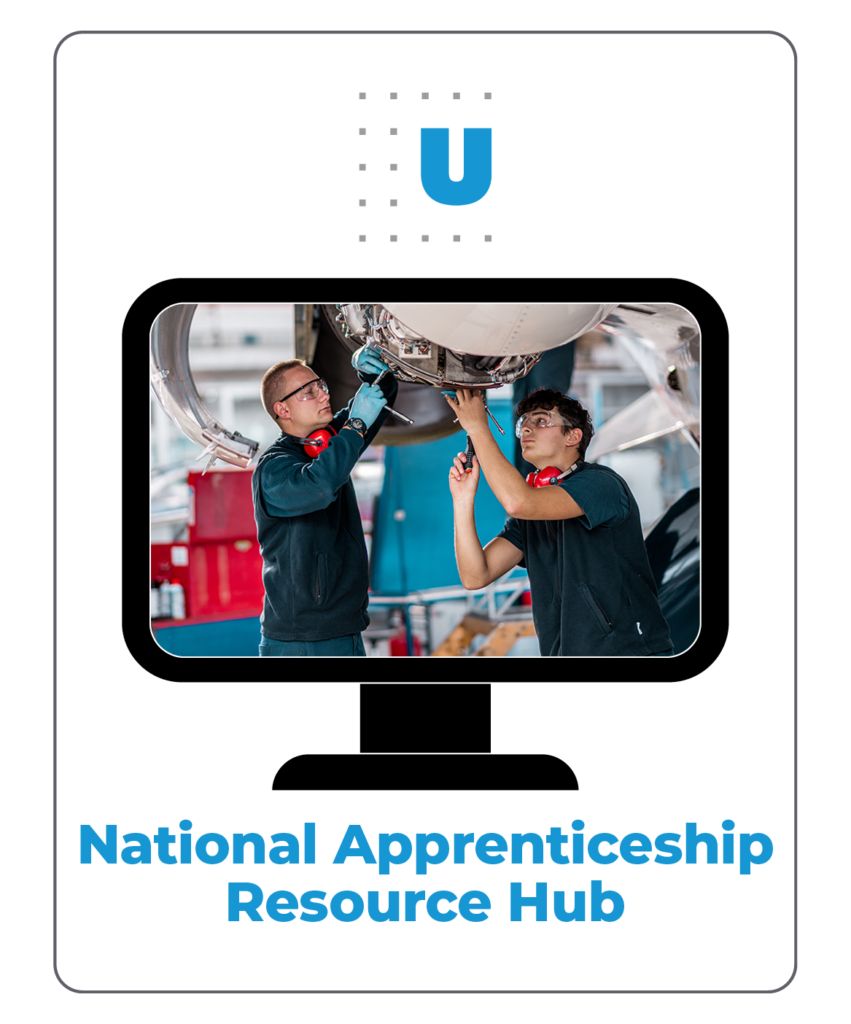
National Apprenticeship Resource Hub
The Urban Institute
December 2024
TOPICS: Apprenticeship , Career Pathways , Trainer and Mentor Development , Training
The National Apprenticeship Resource Hub includes Occupational Frameworks which can help develop a new apprenticeship program or refine an existing program. Each framework outlines the basic information sponsors need to register an apprenticeship program in their occupation including an occupational overview that describes the occupation, alternative job titles, and any prerequisites; a work process schedule that outlines what organizations can expect apprentices to learn on the job and the required hours; and a related technical instruction outline that presents considerations for courses and training apprentices can pursue during the apprenticeship. The National Occupational Frameworks also include detailed instructions on how to use them when creating your registration application.
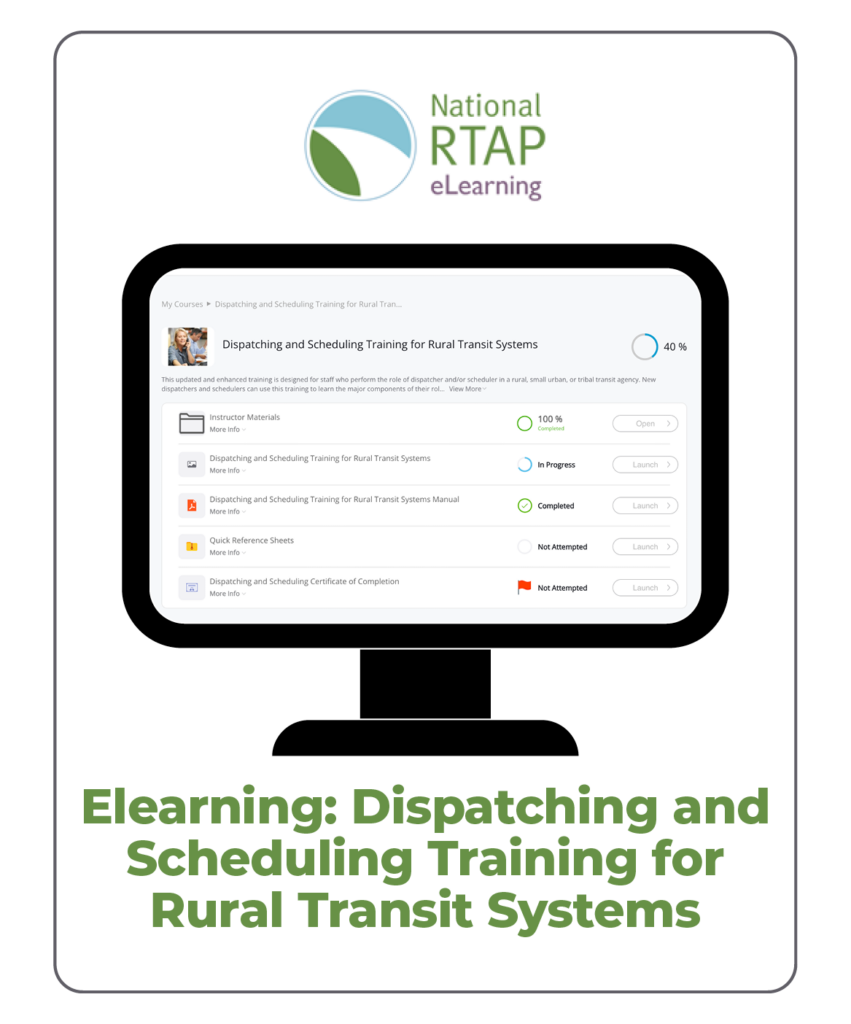
Elearning: Dispatching and Scheduling Training for Rural Transit Systems
National RTAP
December 2024
TOPICS: Training
This online training is designed for staff who perform the role of dispatcher and/or scheduler in a rural, small urban, or tribal transit agency. New dispatchers and schedulers can use this training to learn the major components of their roles. Seasoned dispatchers and schedulers can also use the training for refreshing their skills.
The entire eLearning course takes approximately 4 hours and covers the topics listed below:
- Working in a Transit Environment
- Transit Service Types
- Americans with Disabilities Act
- Essential Communication Skills
- Customer Service
- Role of the Dispatcher
- Role of the Scheduler
- Use of Technology
- Working as a Transit Team
- Responding to Transit Incidents
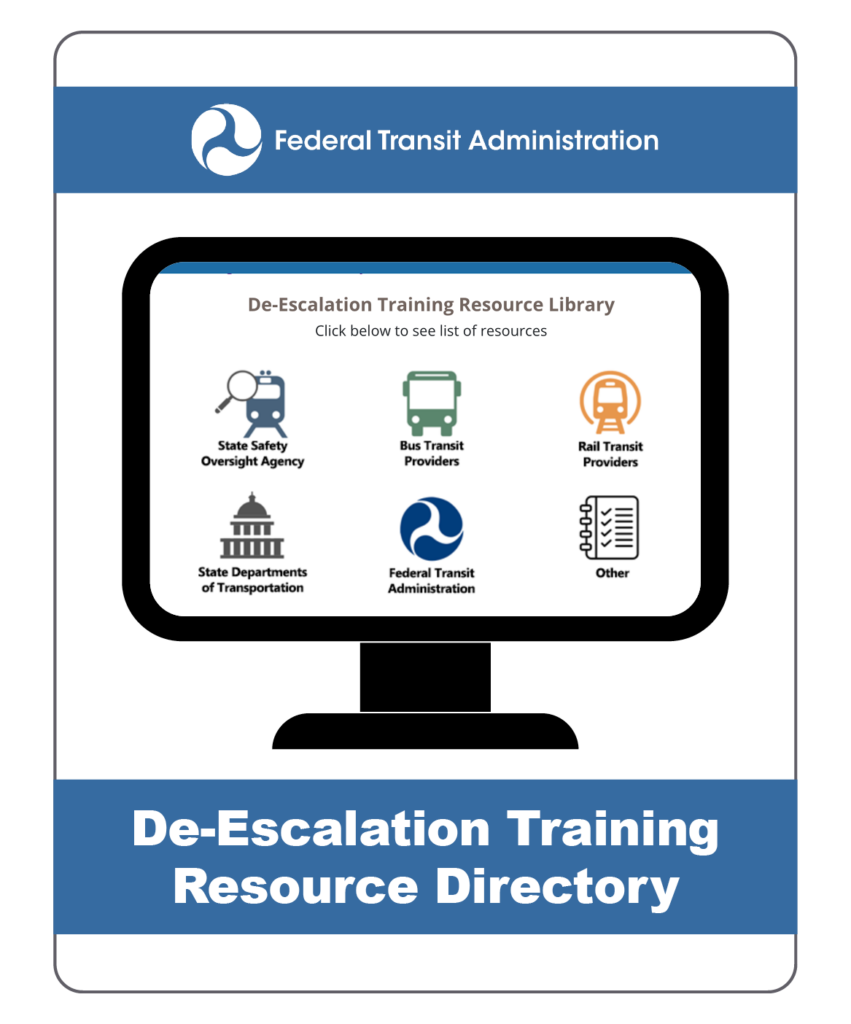
De-Escalation Training Resource Directory
The Federal Transit Administration (FTA) has gathered these resources to support the transit industry in developing, implementing, and updating their training programs. The resources illustrate ways agencies throughout the transit industry are implementing de-escalation training.
Federal Transit Administration
February 2024
TOPICS: Policy and Planning , Safety and Health , Training
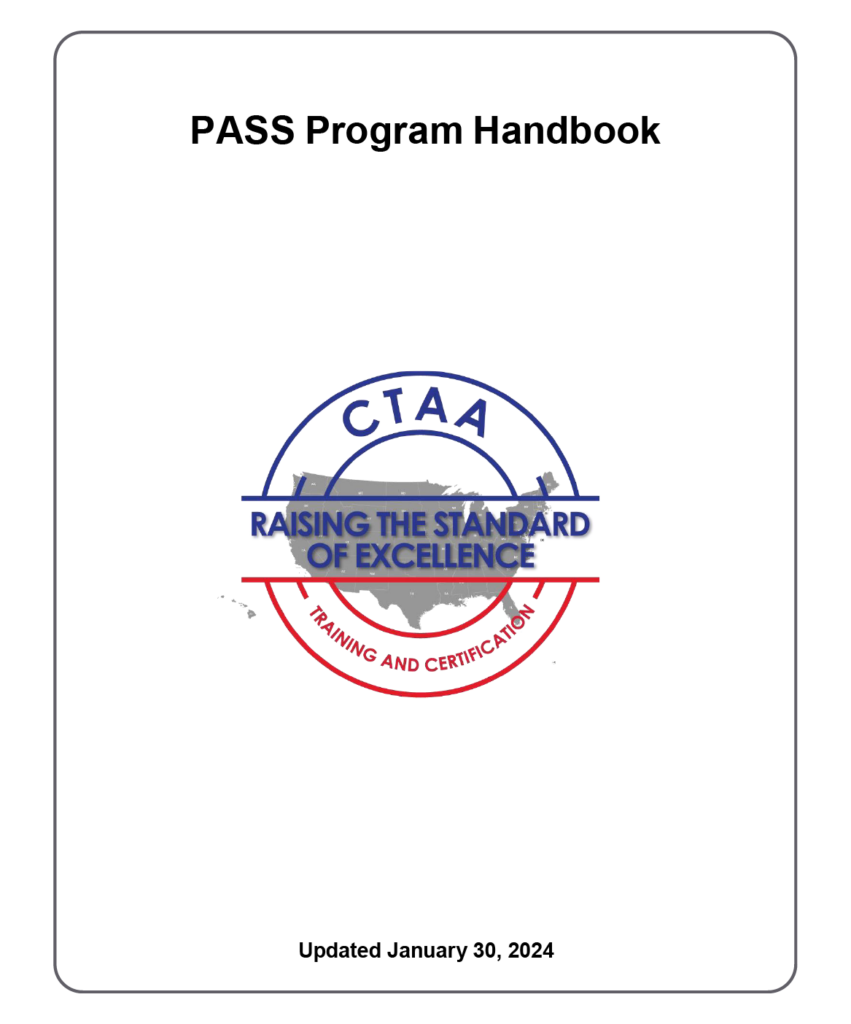
Passenger Assistance, Safety And Sensitivity (PASS) Program Handbook
CTAA’s Passenger Assistance, Safety and Sensitivity (PASS) driver training program provides resources and standards for operators to transport passengers in the most safe, sensitive and careful manner possible. PASS is ideal for non-emergency medical transportation (NEMT) trips, for ADA paratransit services, for specialized transit for older passengers, for human and social service riders — really any transportation operation where the passengers require extra care.
Community Transportation Association of America
January 2024
TOPICS: Community Engagement , Safety and Health , Training
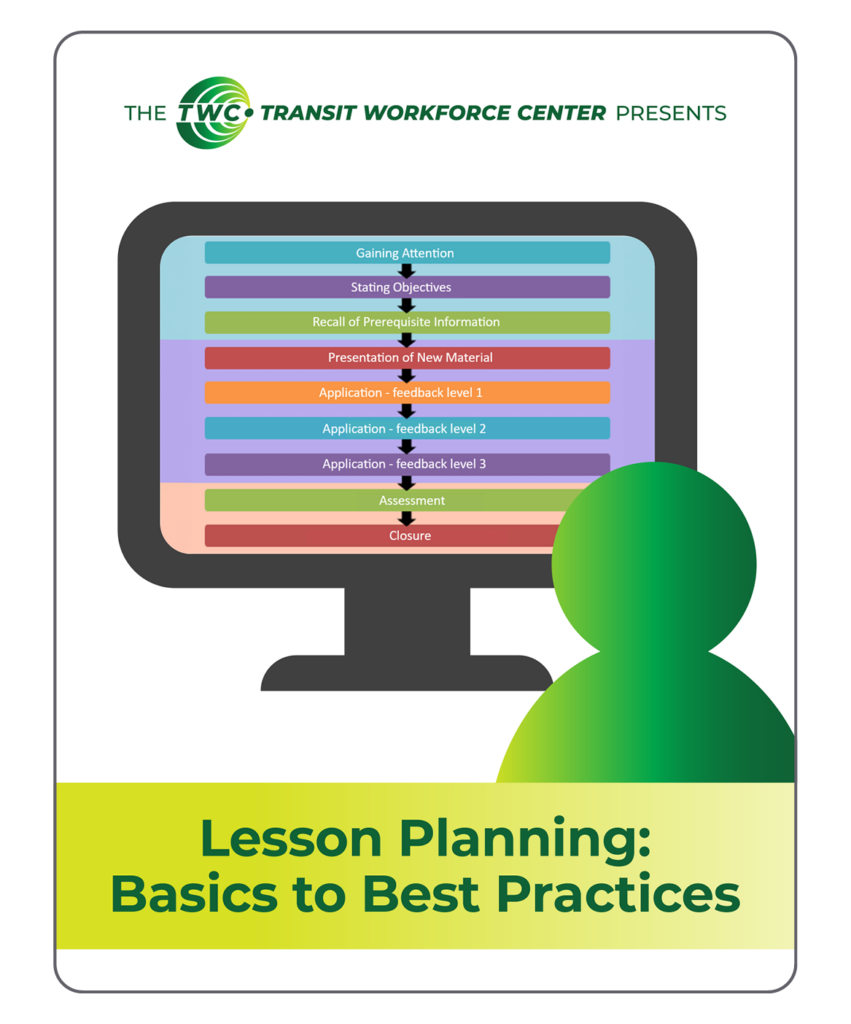
Lesson Planning Webinar: Basics to Best Practices
Have you ever been tasked with developing or delivering a class and didn’t know where to start? Do you have a class that isn’t engaging learners and you don’t know why? On September 26, 2023, TWC hosted an informative webinar on Lesson Planning basics and best practices with award winning author and advisor on all things training, Dr. Chuck Hodell. We took a high-level look at Lesson Planning for those new to training, as well as discussed how to overcome inherent challenges and best practices for transit trainers.
Transit Workforce Center
September 2023
TOPICS: Trainer and Mentor Development , Training
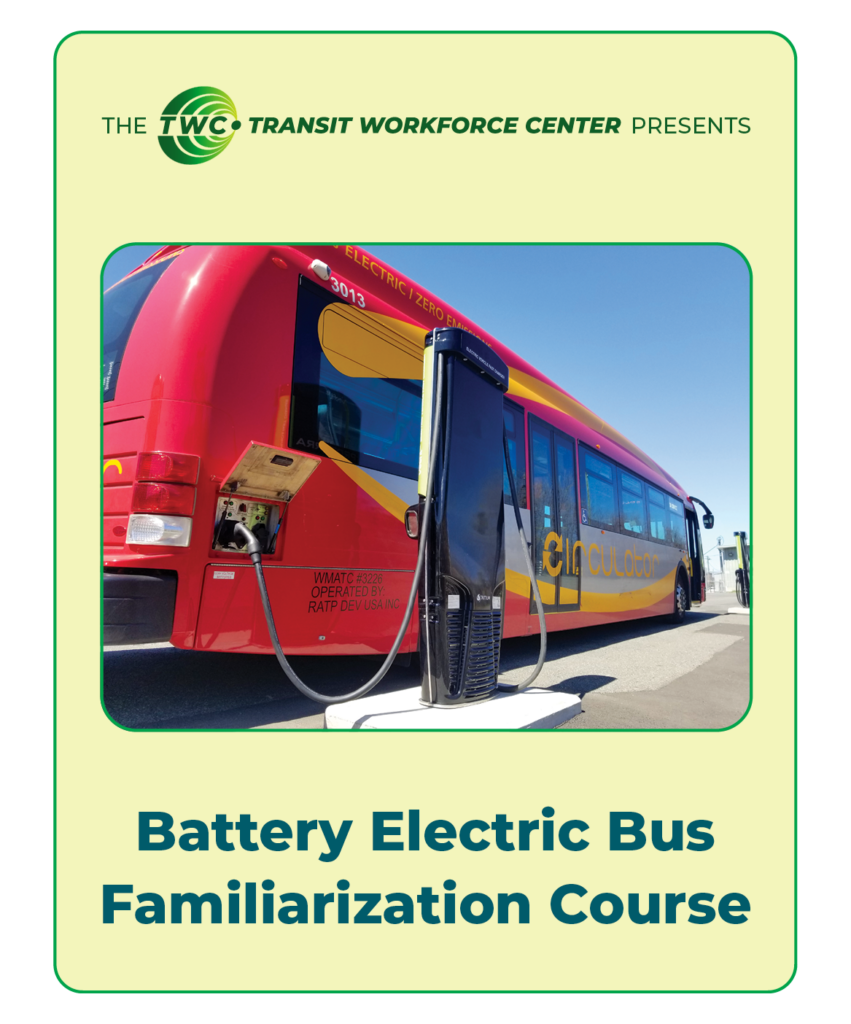
Battery Electric Bus Familiarization Course
Transit Workforce Center
September 2023
This course provides participants with an overview and familiarization to battery electric bus (BEB) basics. This will include an overview of what a BEB is, and what makes it both similar and different from its standard transit counterparts. The course will include sections on BEB components and systems, details on its internal functions (CAN, High Voltage systems, battery packs, etc.), the management systems, and a quick glance at preventive maintenance tasks. The course will follow up with a module on some electrical fundamentals, safety features, considerations, risk and hazard assessment, PPE, and comes with demonstrations of actual technicians performing de-energization (LOTO) of a Proterra and New Flyer model bus, and concludes with the third module introducing details involved with BEB charging, including the details of current BEB charging technologies, emerging charging technologies and opportunities, electric vehicle charging standards, and common considerations in charging maintenance and charger safety precautions.
Disclaimer : This course is intended only as informal guidance on the matters addressed, and should not be relied upon as the sole method or manner for performing the tasks or work outlined in the materials.
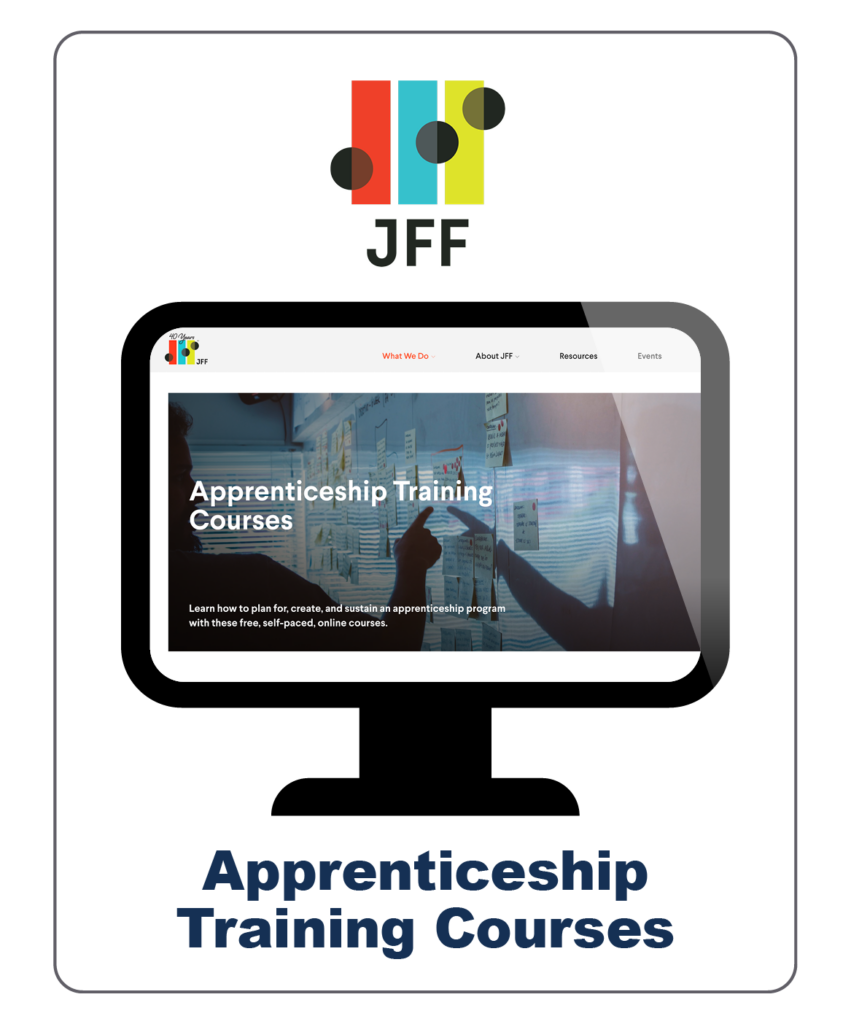
Apprenticeship Training Courses
This series of free online training courses will help transit providers and others plan for, create, and sustain registered apprenticeship programs. Several courses have already been released and others are forthcoming.
Jobs for the Future
March 2023
TOPICS: Apprenticeship , Career Pathways , Mentorship , Trainer and Mentor Development , Training
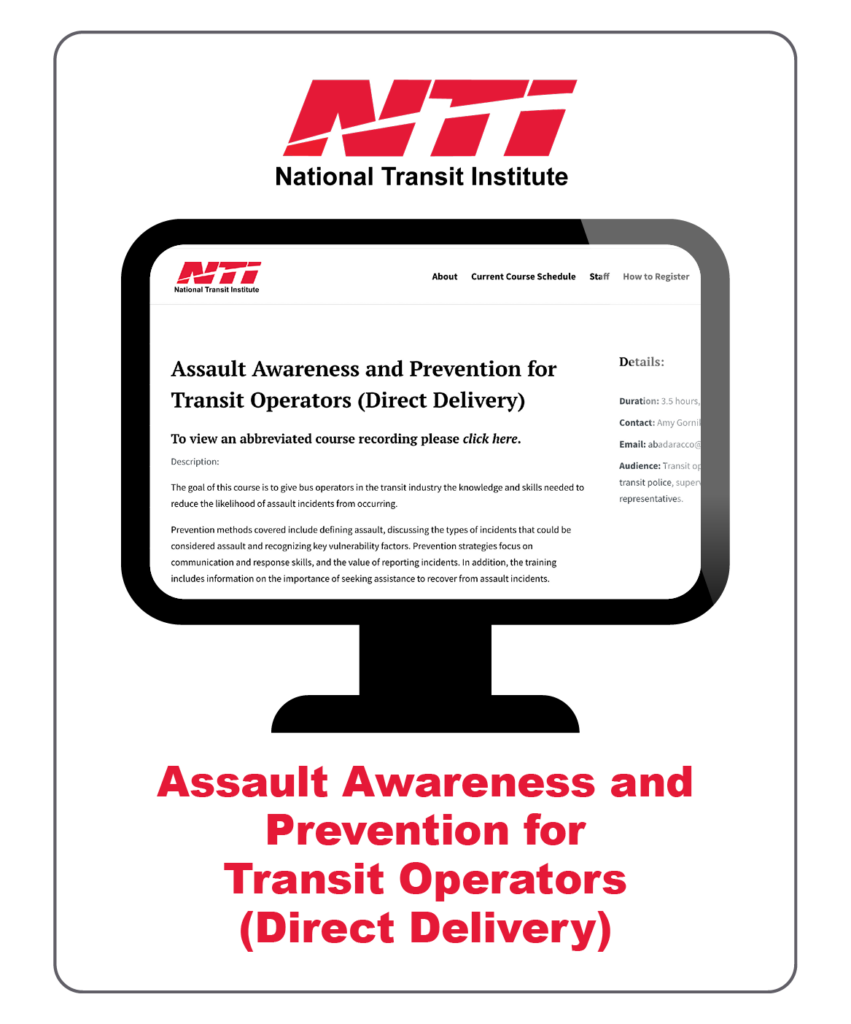
Assault Awareness and Prevention for Transit Operators (Direct Delivery)
This course provides transit bus operators with knowledge and skills to reduce the likelihood of assault incidents, including defining assault and types of incidents that could be considered assault, covering prevention strategies such as communication and response skills, and emphasizing the importance of reporting assault incidents and seeking recovery assistance.
National Transit Institute
TOPICS: Safety and Health , Training
You can register for the course with the Rutgers University Noncredit Course Catalog & Registration System.
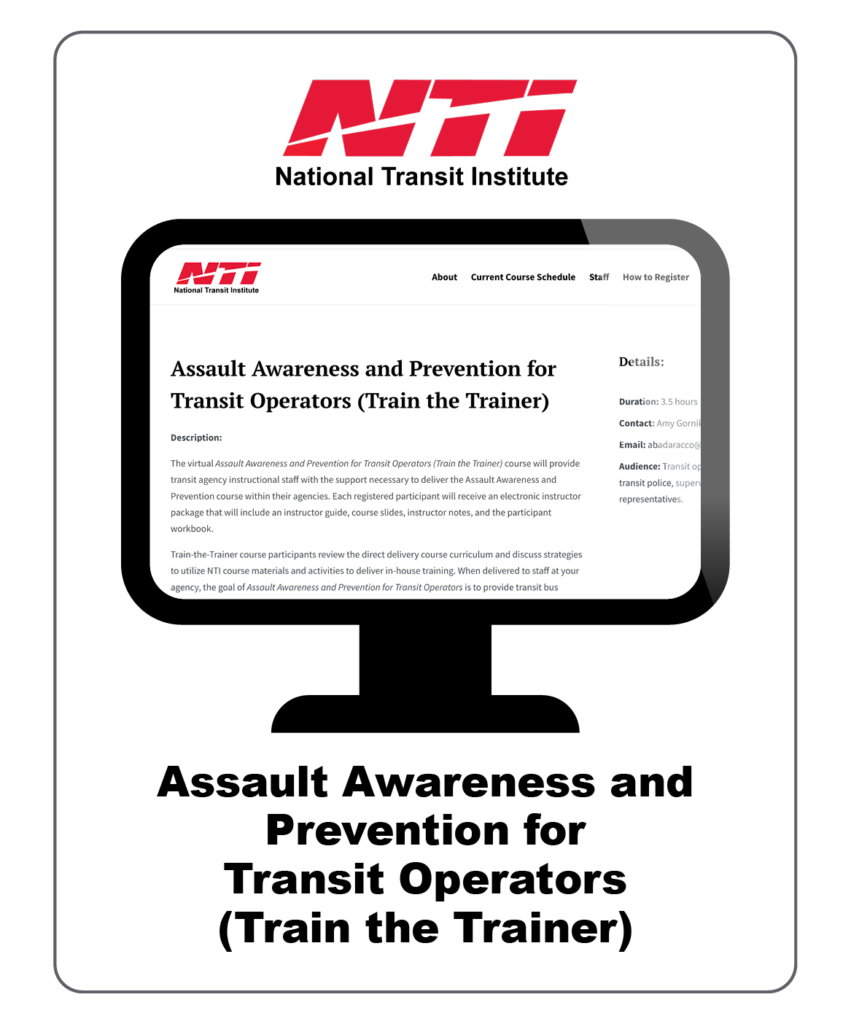
Assault Awareness and Prevention for Transit Operators (Train the Trainer)
This virtual course will provide transit agency instructional staff with the support necessary to deliver the Assault Awareness and Prevention course within their agencies. Each registered participant will receive an electronic instructor package that will include an instructor guide, course slides, instructor notes, and the participant workbook. Participants will be able to deliver the training to provide transit bus operators with knowledge and skills to reduce the likelihood of assault incidents.
National Transit Institute
January 2023
You can register for the course with the Rutgers University Noncredit Course Catalog & Registration System. The direct delivery course for operators can be found here.
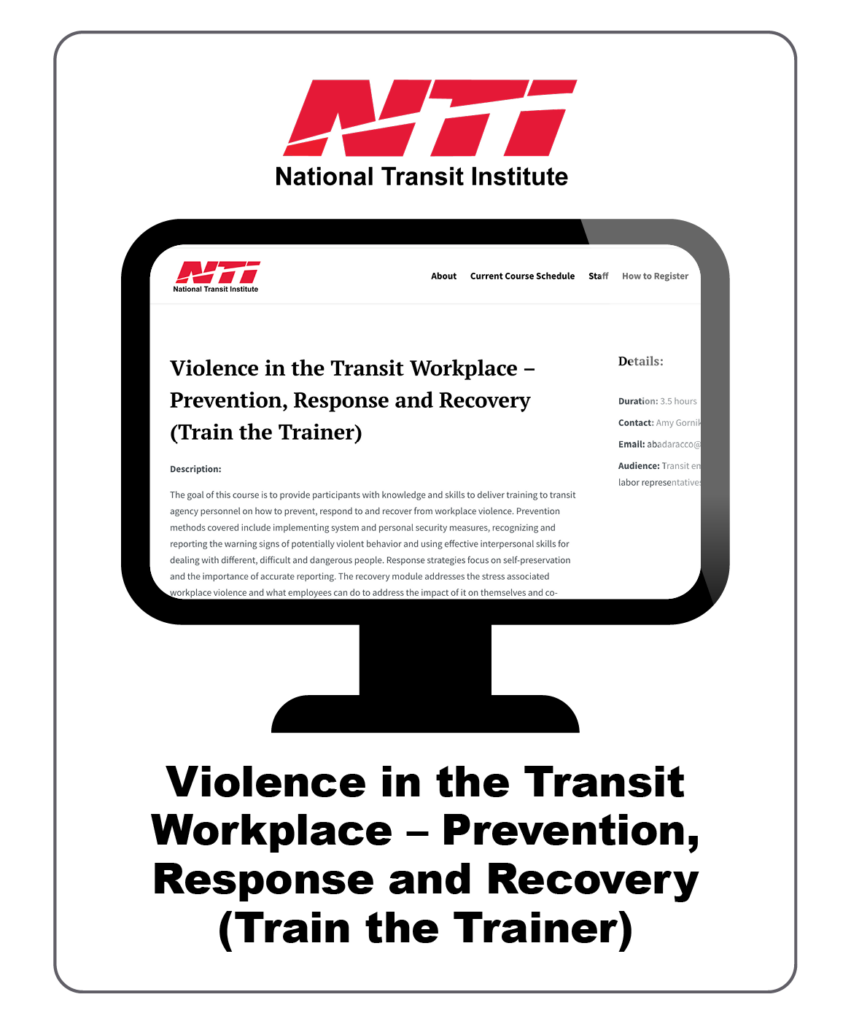
Violence in the Transit Workplace – Prevention, Response and Recovery (Train the Trainer)
The goal of this course is to provide participants with knowledge and skills to deliver training to transit agency personnel on how to prevent, respond to, and recover from workplace violence. Prevention methods covered include implementing system and personal security measures, recognizing and reporting the warning signs of potentially violent behavior and using effective interpersonal skills for dealing with different, difficult and dangerous people.
National Transit Institute
You can register for the course with the Rutgers University Noncredit Course Catalog & Registration System.
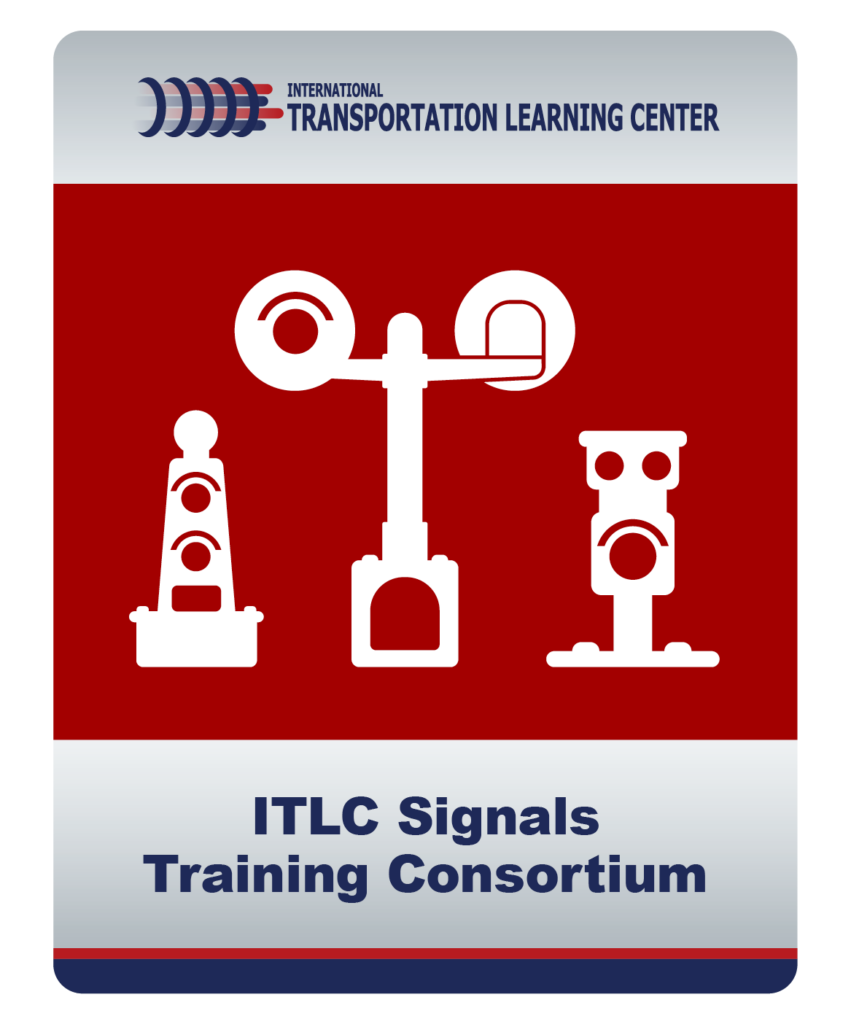
ITLC Signals Training Consortium
The International Transportation Learning Center (ITLC) organizes multiple national training consortia to develop standards-based national training courseware for frontline occupations in public transportation organizations.
In 2013, public transportation agencies and unions across the country came together to form the National Signals Maintenance Training Consortium. They were driven to create a full set of standardized national courseware to support training and apprenticeship programs for signal maintainers. Since then, over 70 signals maintenance subject matter experts from 26 member agencies and unions have worked with instructional systems designers from the ITLC to create a comprehensive training program for signal maintainers.
International Transportation Learning Center
November 2022
TOPICS: Safety and Health , Training
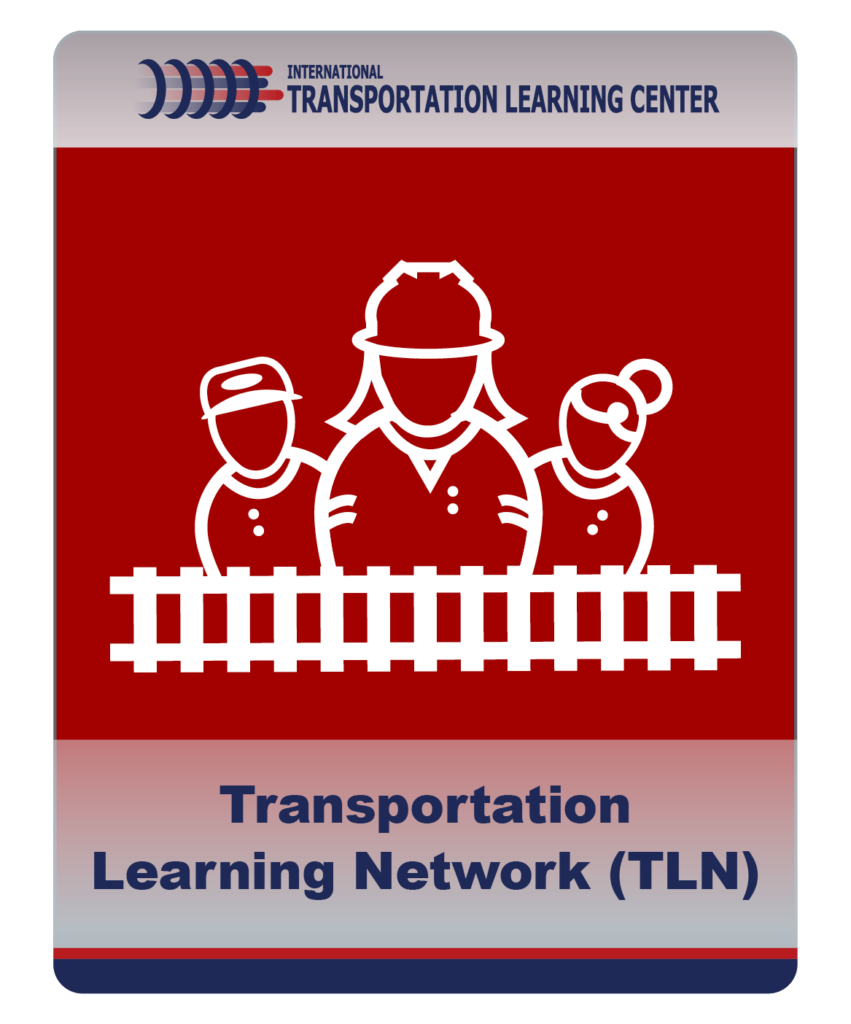
Transportation Learning Network (TLN)
The Transportation Learning Network (TLN) is part of an industry-wide effort aimed at strengthening transit training programs. It is designed and maintained by the International Transportation Learning Center, and provides a platform for accessing industry specific training materials – both for direct self-led online learning and also for download by trainers to use in a classroom or field settings. Topics covered include maintenance of transit elevators and escalators, signals, railcar and traction power.
International Transportation Learning Center
September 2022
TOPICS: Apprenticeship , Safety and Health , Training
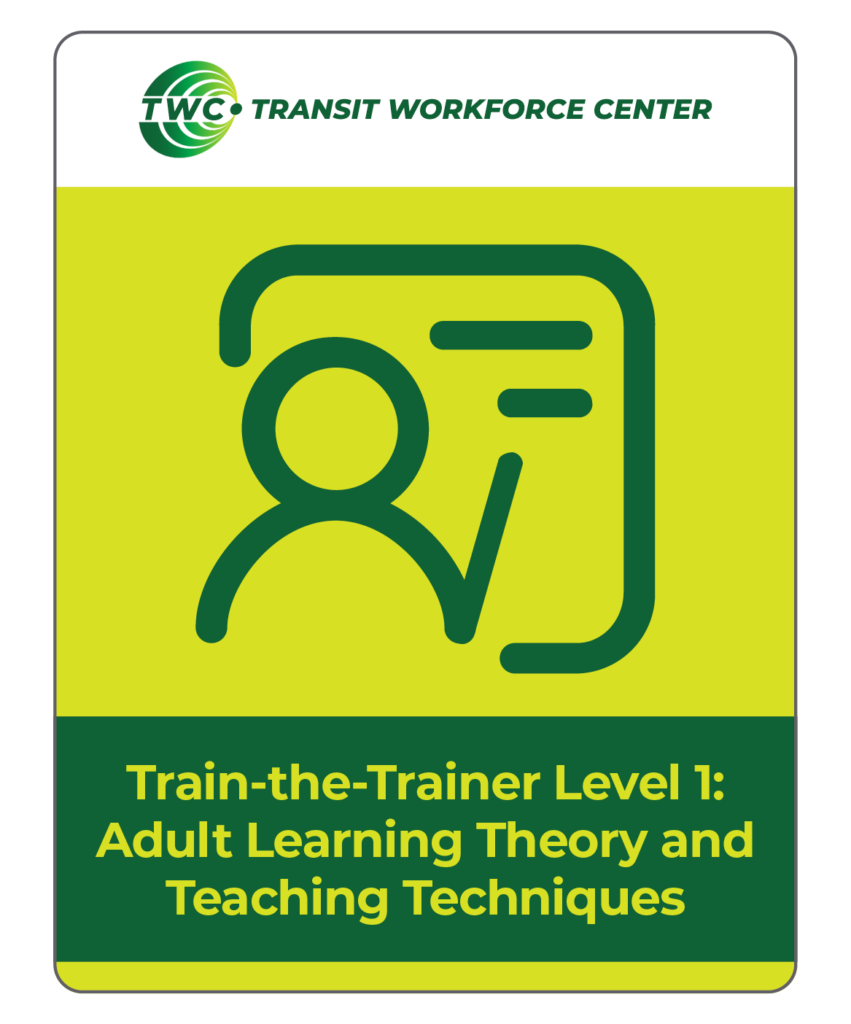
Train-the-Trainer Level 1: Adult Learning Theory and Teaching Techniques
The International Transportation Learning Center’s week-long, highly engaging train the trainer course teaches subject matter experts the skills to convey their vast knowledge to others in a classroom setting. Topics include: adult learning theory, teaching techniques and presentation skills. Participants will spend most of the week applying what they’re learning through rounds of practice teaching in a classroom, lab and field setting. They’ll also give and receive feedback from peers – one of the most important skills of a trainer!
Subsequent learning opportunities include Train-the-Trainer Level 2: Creating Courseware that Works.
International Transportation Learning Center
TOPICS: Safety and Health , Trainer and Mentor Development , Training
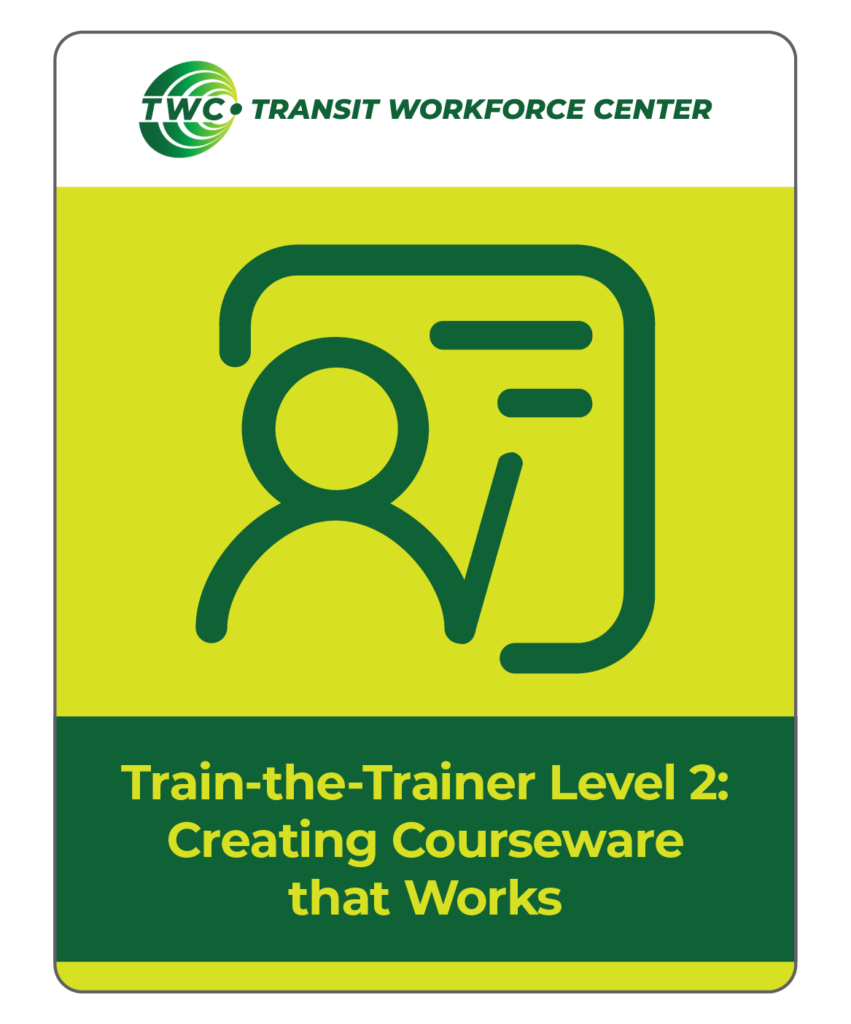
Train-the-Trainer Level 2: Creating Courseware that Works
This week-long, interactive course, Train the Trainer Level 2, builds on Train the Trainer Level 1 by giving experienced trainers the skills to define, design and develop an effective and engaging training course and accompanying courseware and assessments, incorporating established adult learning principles. Participants apply this new knowledge by starting to develop materials for a course of their choosing, which would ultimately be taught at their location.
International Transportation Learning Center
TOPICS: Safety and Health , Trainer and Mentor Development , Training
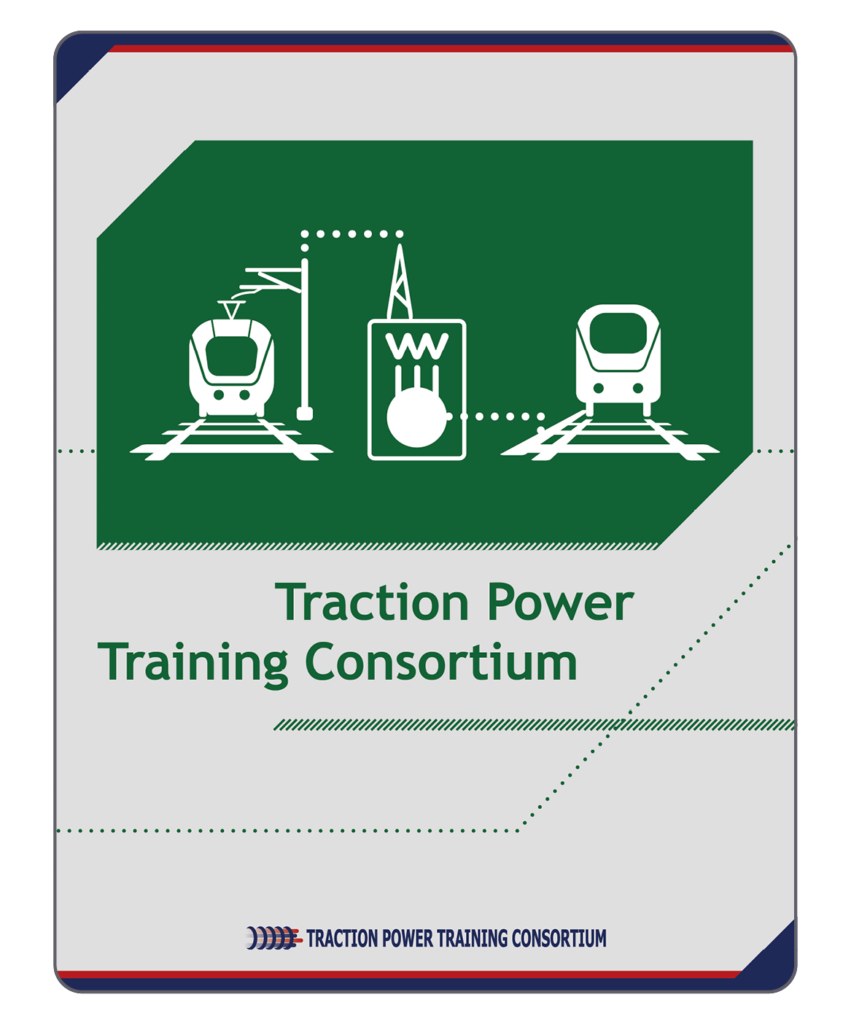
Traction Power Training Consortium
The International Transportation Learning Center (ITLC) organizes multiple national training consortia to develop standards-based national training courseware for frontline occupations in public transportation organizations.
Launched by the ITLC in March 2020, the Traction Power Training develops introductory and advanced instruction-ready and interactive courses on traction power maintenance that build on APTA-approved and industry-recognized training standards. Course topics include: worker safety, troubleshooting traction power systems, power distribution, substations, overhead and third rail power distribution, and lifting and rigging operations.
International Transportation Learning Center
TOPICS: Safety and Health , Training
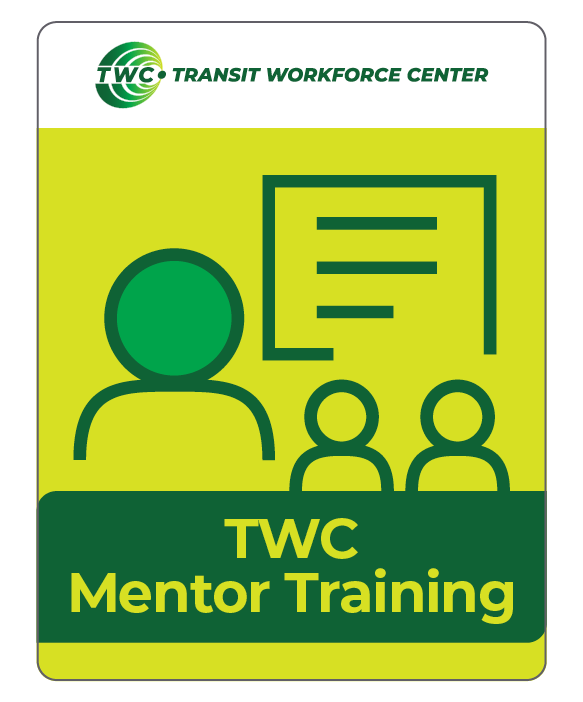
Mentor Training
Transit Workforce Center
TOPICS: Mentorship , Trainer and Mentor Development , Training
This workshop is designed for employees or journeyworkers designated as mentors to support on-the-job learning for apprenticeship programs. The content includes a review of mentor roles, an introduction to learning styles, and a facilitated discussion about communication and problem solving. The second half of the workshop includes role playing exercises for the participants to practice what they learned. The instructor leads the participants through a structured review of that experience and review of the mentoring concepts presented. The program acknowledges the wisdom of the mentors and encourages them to view themselves as ambassadors for the apprenticeship and advocates for the apprentices.
Please follow the link below for additional details and to submit a mentor training request.
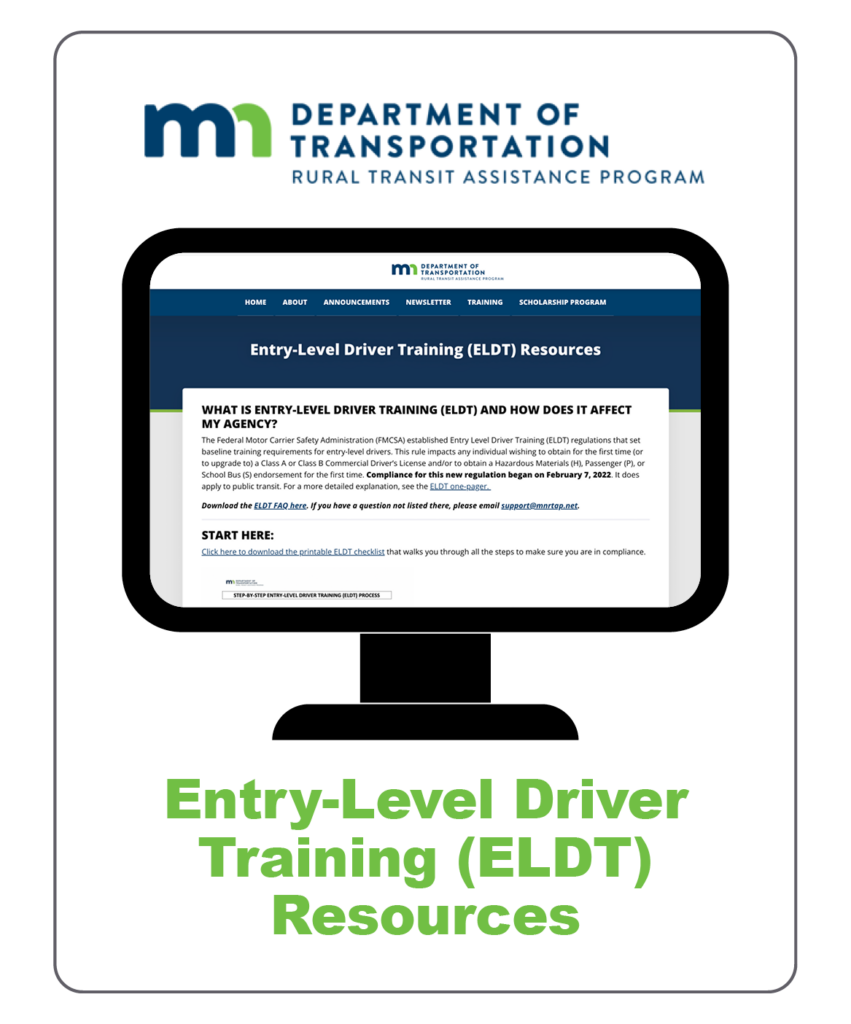
Entry-Level Driver Training (ELDT) Resources
The Federal Motor Carrier Safety Administration (FMCSA) established Entry Level Driver Training (ELDT) regulations that set baseline training requirements for entry-level drivers. This rule impacts any individual wishing to obtain for the first time (or to upgrade to) a Class A or Class B Commercial Driver’s License. These resources from the Minnesota Rural Transit Assistance Program (RTAP) provide information about the regulations, training materials, training providers, checklists, etc. to assist transit agencies in complying with regulations.
Minnesota Rural Transit Assistance Program
February 2022
TOPICS: Career Pathways , Hiring and Recruitment , Training
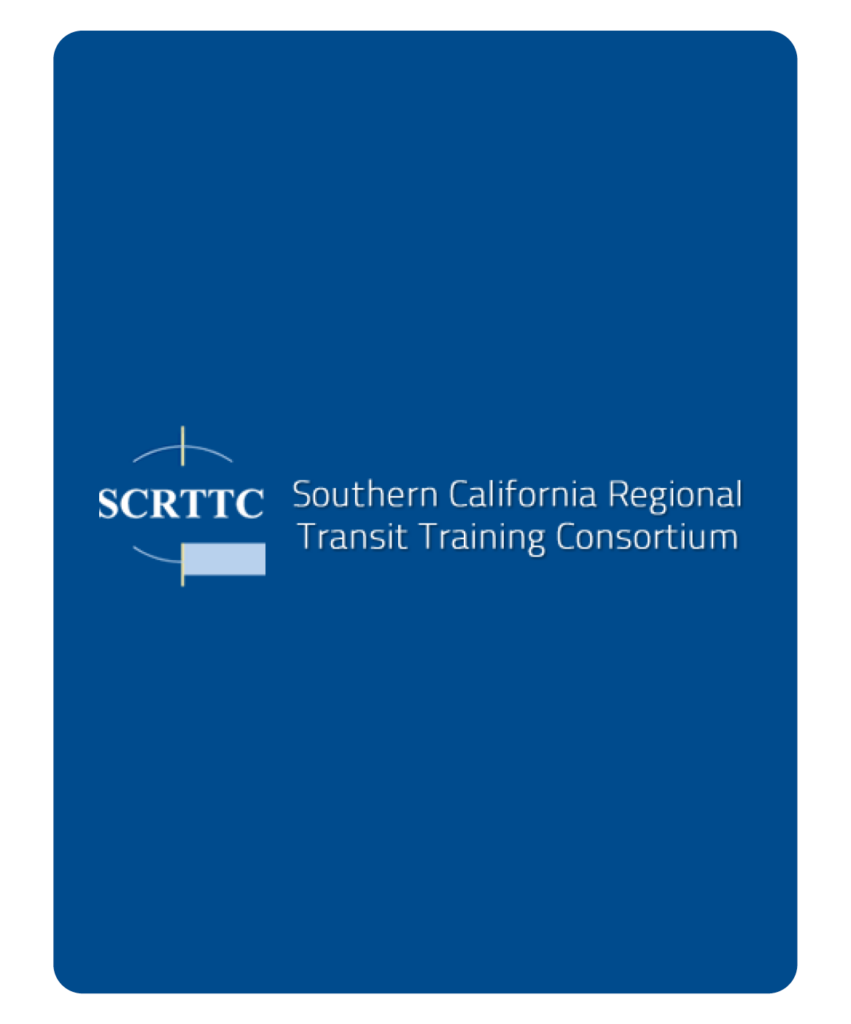
California Transit Training Consortium (CTTC)
The California Transit Training Consortium, founded as the Southern California Regional Transit Training Consortium, is comprised of community colleges, universities, transit agencies, and public and private partners collaborating to design, develop, and deliver technical training for the improvement of the transit workforce in California.
California Transit Training Consortium
TOPICS: Training
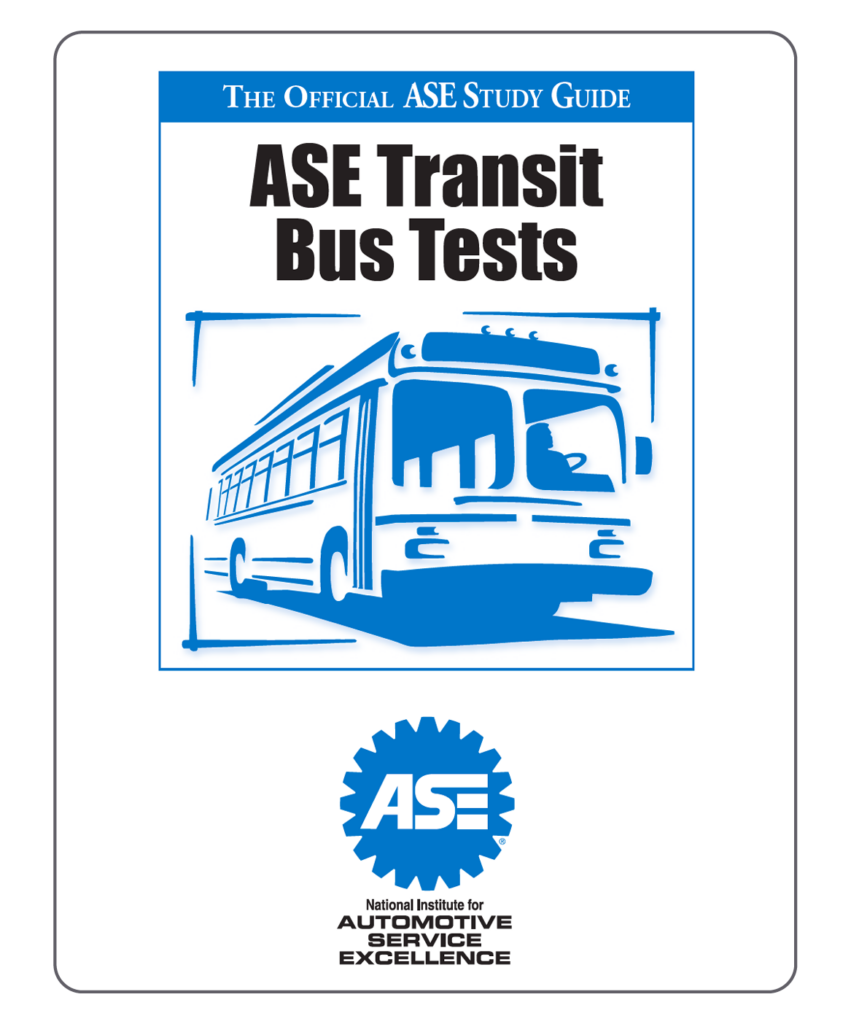
ASE Transit Bus Test Study Guide
The Official ASE Study Guide for Transit Bus Tests is designed to help technicians prepare for the ASE certification tests, which identify and recognize those Transit Bus Technicians who demonstrate knowledge of the skills necessary to diagnose, service, and repair various systems on transit buses.
Automotive Service Excellence (ASE)
January 2021
TOPICS: Safety and Health , Training , Zero Emission Buses
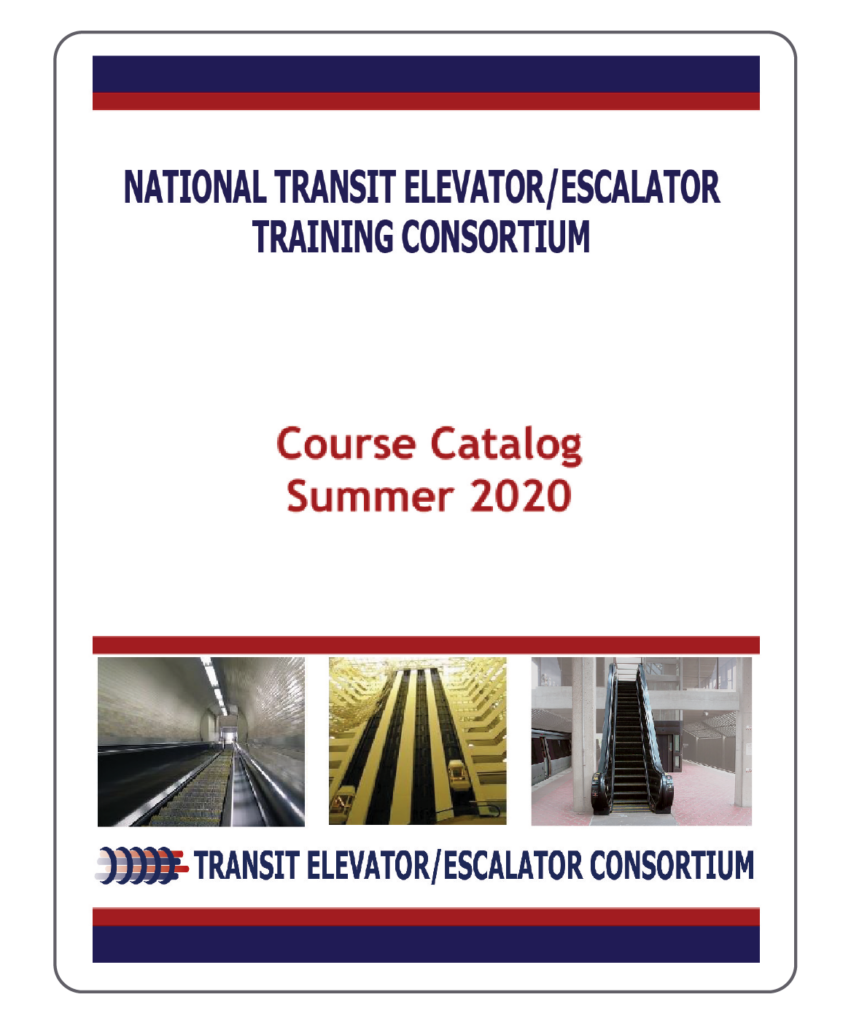
Elevator/Escalator Training Consortium
International Transportation Learning Center
The International Transportation Learning Center (ITLC) organizes multiple national training consortia to develop standards-based national training courseware for frontline occupations in public transportation organizations.
The Transit Elevator-Escalator Training Consortium (the Consortium) was the first in an ongoing series of industry-wide collaborative programs to develop integrated systems of training for key frontline occupations in public transportation. Building on national training standards developed by industry Subject Matter Experts (SMEs) from 2006 to 2010 and then adopted by the American Public Transportation Association (APTA), the Consortium developed a full set of standardized national courseware to support training and apprenticeship programs for transit elevator/escalator (El-Es) technicians. The curriculum and courseware development team was composed of subject matter experts (SMEs) from five member agencies and unions from across the country. Membership of the Consortium consists of transit systems that maintain their vertical transportation equipment in-house, rather than relying on outside contractors. Equipment manufacturers contributed access to their technical drawings and manuals to enrich the courseware.
The list of courseware as of Summer 2020 is contained in the attached catalog.
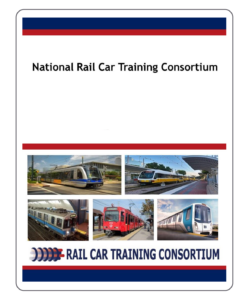
ITLC Rail Car Training Consortium
The International Transportation Learning Center (ITLC) organizes multiple national training consortia to develop standards-based national training courseware for frontline occupations in public transportation organizations.
Started in late 2015, the National Rail Car Training Consortium has moved forward with its mission to create standardized national training courseware for rail car technicians. The development team composed of over 40 rail car maintenance subject matter experts (SMEs) from 18 member agencies and unions from across the country, along with instructional systems designers from the ITLC, design curriculum and courseware for the rail and transit industry.
The attached catalog contains a summary of Consortium courseware.
International Transportation Learning Center
July 2020
TOPICS: Safety and Health , Training
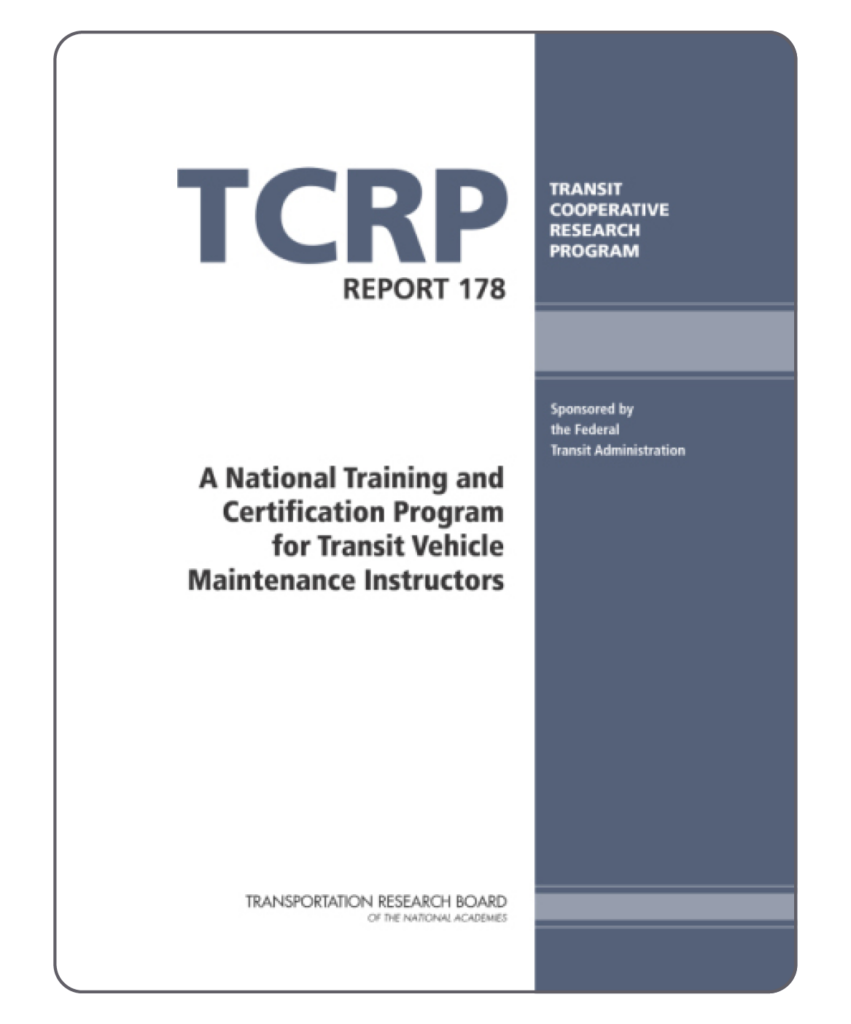
A National Training and Certification Program for Transit Vehicle Maintenance Instructors
This TCRP report provides a proposed national program structure and plan for training and certifying transit bus and rail maintenance instructors. The report also provides best practices used in the public and private sectors to prepare and certify technical instructors, as well as the attributes and instructional delivery methods found most effective for maintenance instructors.
Transit Cooperative Research Program
January 2015
TOPICS: Trainer and Mentor Development , Training
Contributor(s): National Academies of Sciences, Engineering, and Medicine; Transportation Research Board; Transit Cooperative Research Program Synthesis Program; Transit Cooperative Research Program; Transportation Learning Center; Educational Data Systems Inc
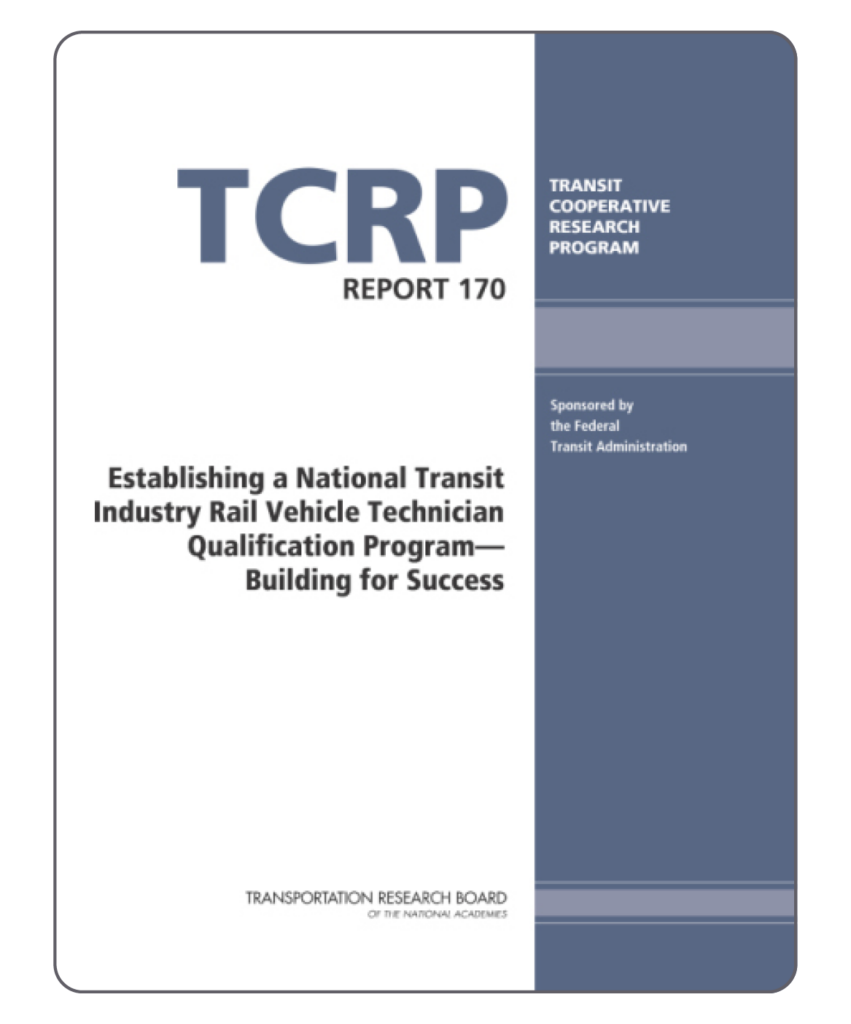
Establishing a National Transit Industry Rail Vehicle Technician Qualification Program—Building for Success
TRB’s Transit Cooperative Research Program (TCRP) Report 170: Establishing a National Transit Industry Rail Vehicle Technician Qualification Program—Building for Success describes a system of qualification that has been developed for rail vehicle technicians. This qualification system is available for implementation through the Transportation Learning Center.
The program integrates national training standards, progressive classroom curricula and introductory courseware, on-the-job learning modules, an apprenticeship framework that combines well-designed sequences of learning, mentoring to support learners, and coordination of classroom and on-the-job learning. The qualification system also includes written and hands-on certification assessments to confirm that technicians have the practical knowledge and skills required to perform their jobs at the highest level of expertise.
Transit Cooperative Research Program (TCRP) & International Transportation Learning Center
January 2014
TOPICS: Career Pathways , Mentorship , Trainer and Mentor Development , Training
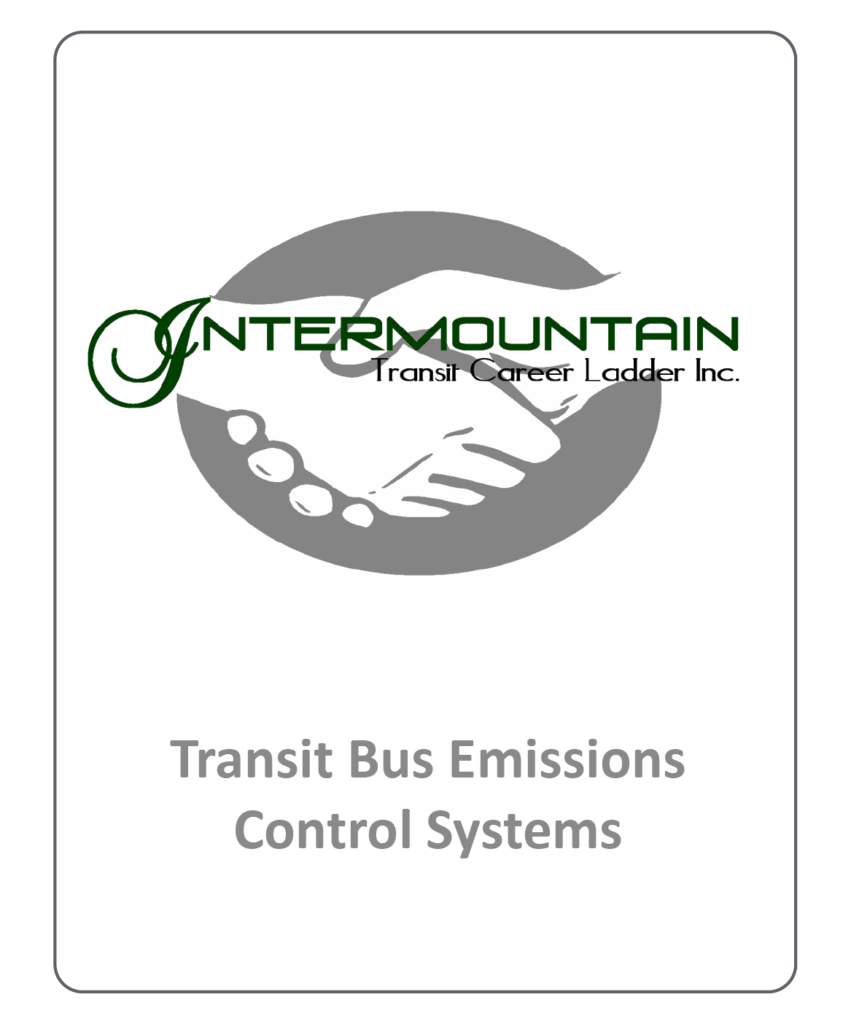
Training Course – Transit Bus Emissions Control Systems
A three-day course designed to deepen bus technicians’ understanding of the operation and maintenance of transit bus emission control systems.
Intermountain Transit Career Ladder, Inc.
January 2011
TOPICS: Training
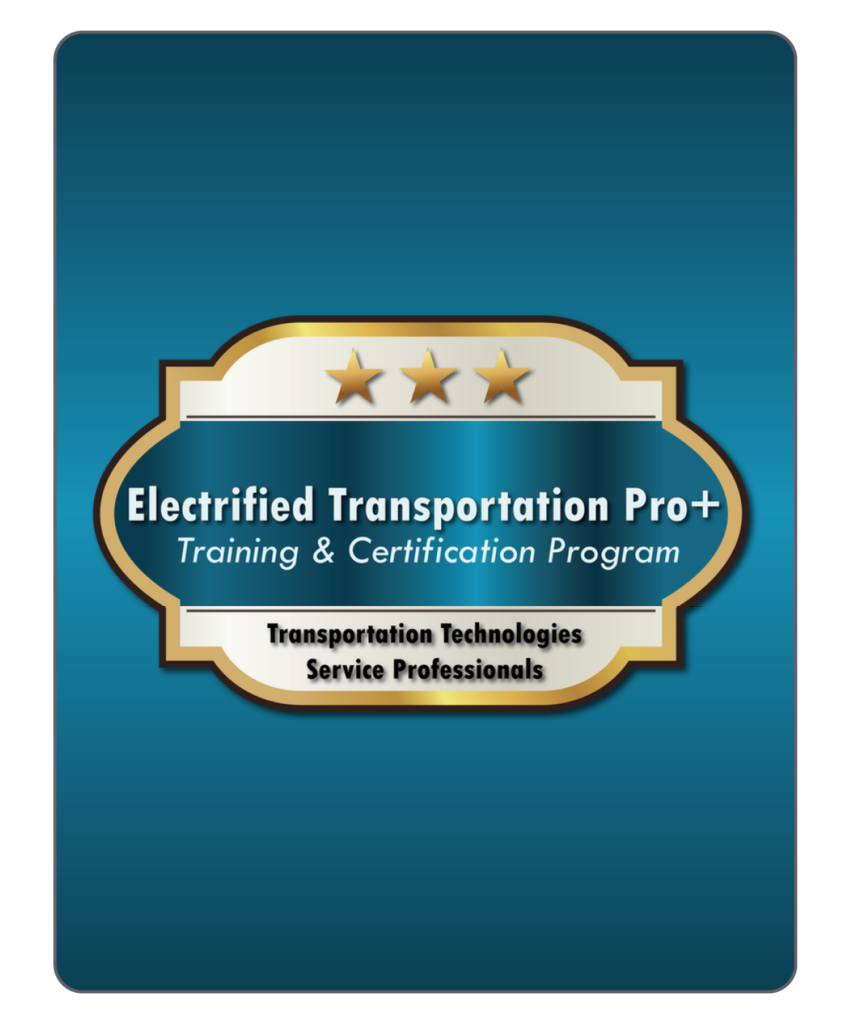
Electrified Transportation Pro+ Training and Certification Program
The objective of the Electrified Transportation Pro+ program is to ensure that all individuals across all transportation industries are trained in Electrified Vehicle Systems and Technologies consistently to one standard. The training is completed in preparation to perform the practical and written exams for earning the corresponding Level 1, Level 2, and Level 3 Certifications.
Electrified Transportation Pro+
TOPICS: Safety and Health , Training , Zero Emission Buses
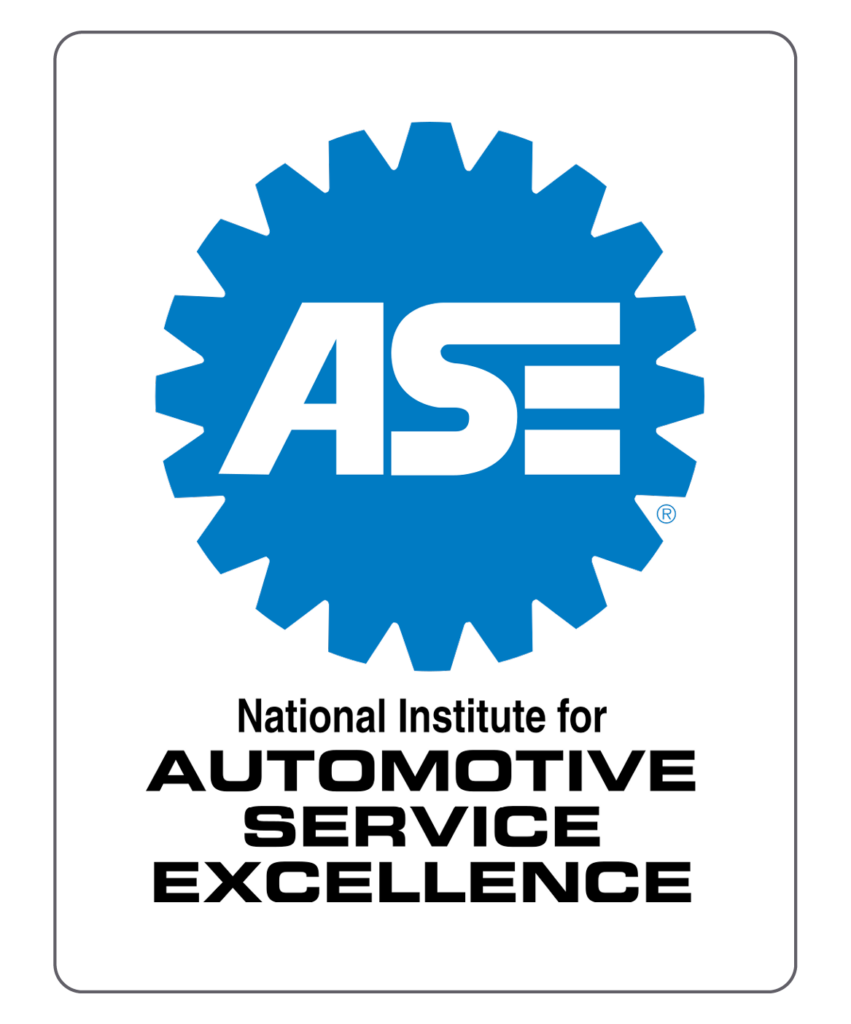
Transit Bus Certification Tests
This Test Series identifies and recognizes Transit Bus Technicians who demonstrate knowledge of the skills necessary to diagnose, service, and repair various systems on transit buses. Technicians can use the Official ASE Study Guide for Transit Bus Tests to prepare.
Automotive Service Excellence
TOPICS: Safety and Health , Training , Zero Emission Buses
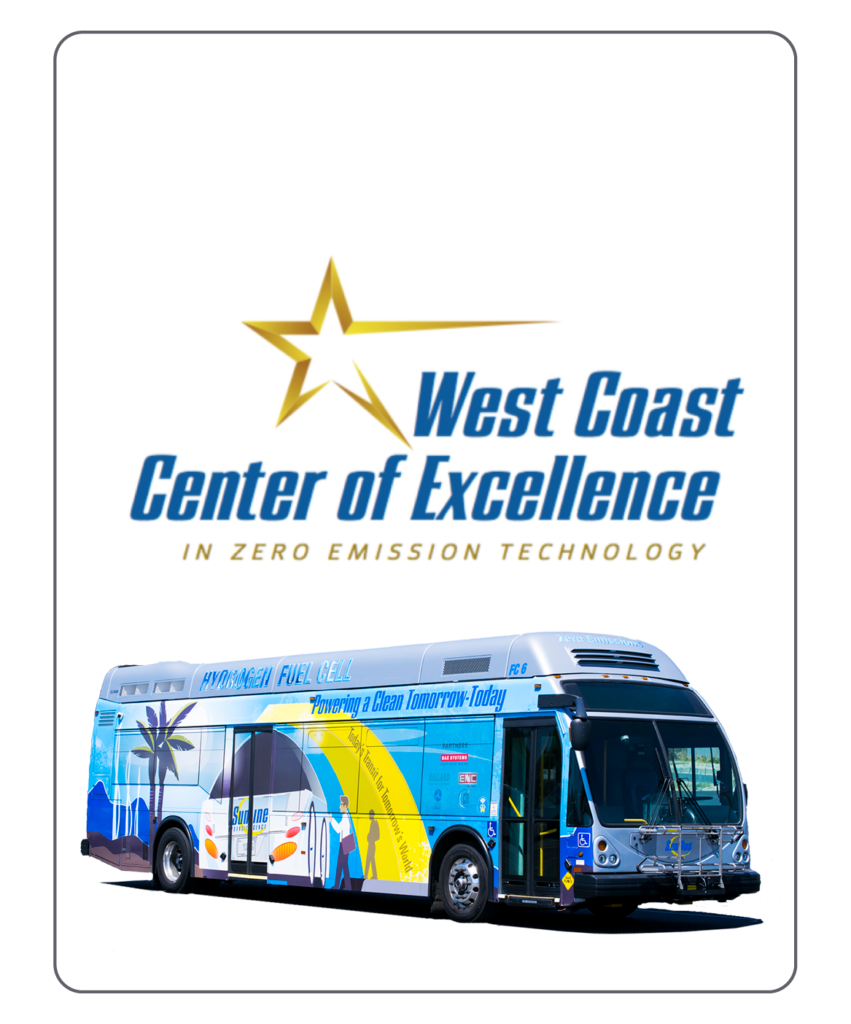
West Coast Center of Excellence in Zero Emission Technology
SunLine Transit Agency’s West Coast Center of Excellence in Zero Emission Technology (WCCOE) is a workforce development program focused on deploying and operating zero emission buses in public fleets. Funded by the FTA, this center provide training, best practice information and access to technology and software geared towards the planning, procurement and deployment of zero emission buses.
SunLine Transit Agency
Course offerings include:
• Leadership and Employee Relations
• Zero Emission Bus Overview
• Zero Emission Bus Operations
• Zero Emission Bus Maintenance
• Financial Management
• Zero Emission Bus Procurement
• Zero Emission Bus Policies and Regulations
• Planning for ZEB Operation
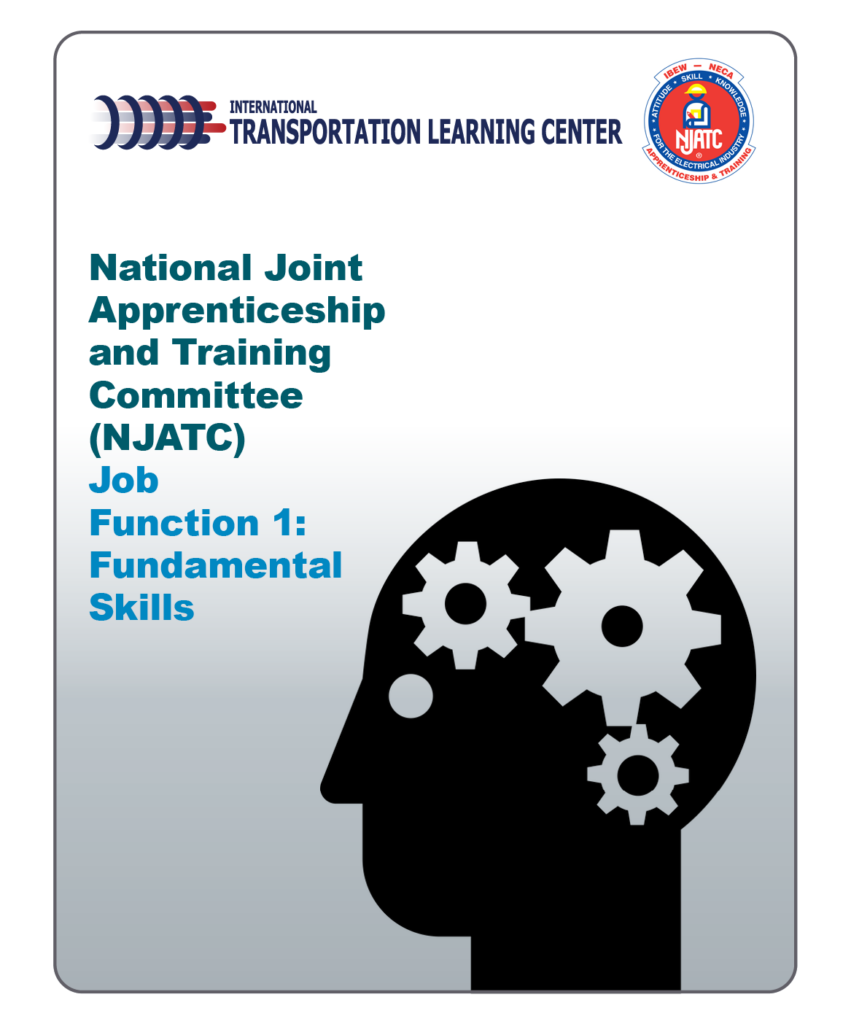
Matrix of Training Materials for Fundamental Bus Maintenance Skills
This matrix of training materials describes resources available to members of the National Joint Apprenticeship and Training Committee (NJATC) through other Committee members and from third-party resources. This document refers to JOB FUNCTION 1: FUNDAMENTAL SKILLS of the Department of Labor Apprenticeship Framework for Bus Maintenance (developed by the ITLC).
Interested parties should contact the provider of each resource directly. Some resources may not currently be available.
National Joint Apprenticeship and Training Committee; International Transportation Learning Center
TOPICS: Apprenticeship , Training
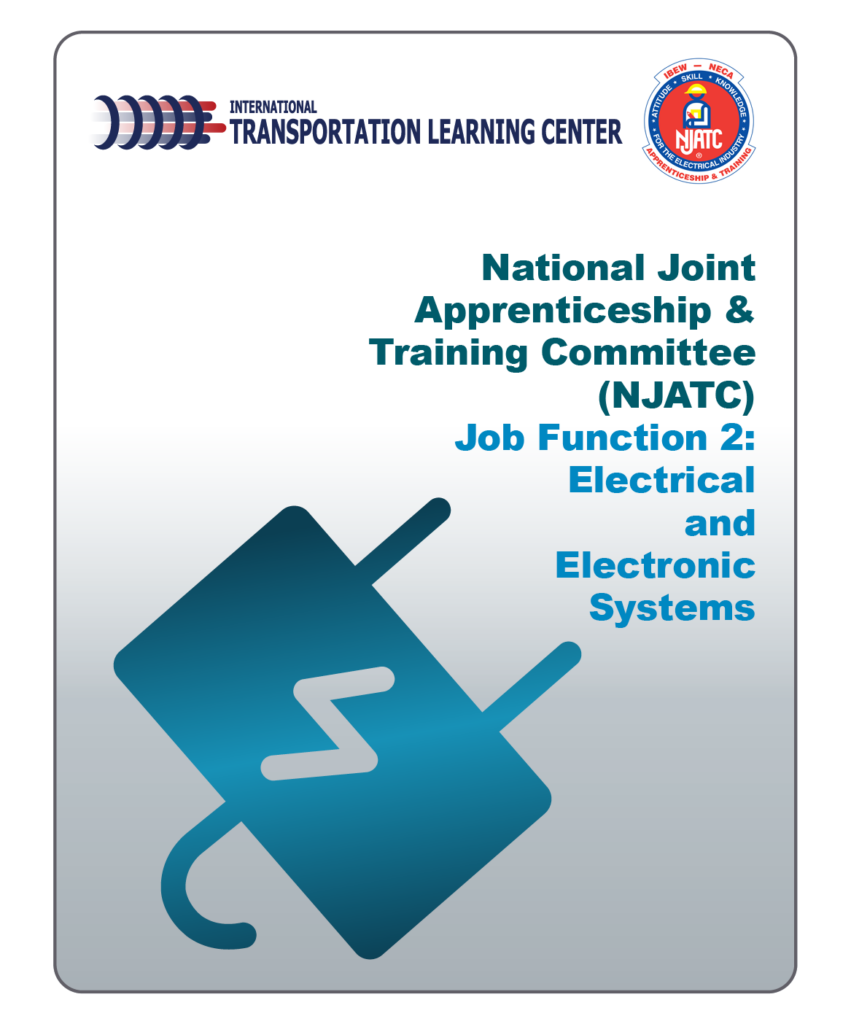
Matrix of Training Materials for Fundamental Electrical/ Electronic Systems Skills
This matrix of training materials describes resources available to members of the National Joint Apprenticeship and Training Committee (NJATC) through other Committee members and from third-party resources. This document refers to JOB FUNCTION 2: Electrical and Electronic Systems of the Department of Labor Apprenticeship Framework for Bus Maintenance (developed by the ITLC).
Interested parties should contact the provider of each resource directly. Some resources may not currently be available.
National Joint Apprenticeship and Training Committee; International Transportation Learning Center
TOPICS: Apprenticeship , Training







